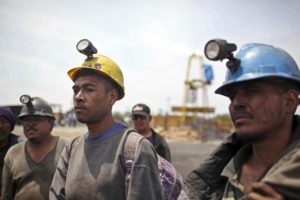Faced with economic crisis and mass protests, Washington’s newest non-NATO ally has turned to brutal repression at home.
June 28, 2024, 4:39 AM

Tuesday was one of the deadliest days in Kenya’s recent history. An estimated two dozen people were slain—some in front of the Kenyan parliament and others in Nairobi’s slums. They were killed by the country’s security forces for exercising their human rights to freedom of expression and peaceful assembly. It was the culmination of a week’s violence, during which young protesters opposing new taxes and the government’s excesses were abducted, arrested, beaten, shot, and tear-gassed.
Kenyan President William Ruto threatened to intensify the repression. He denounced the protests as “treasonous,” smeared its participants as “criminals,” and ominously directed the security forces to “deploy all measures.” Police moved from using tear gas to live ammunition.
In a second speech on Wednesday, bowing to public pressure, he appeared to take a step back, saying he wouldn’t sign the controversial finance bill that prompted the protests, which would have imposed punitive taxes. It was a victory for the Kenyan people, but it has come at huge cost.
This major political miscalculation has lost Ruto the backing of the nation and deeply damaged Kenya’s fragile democracy. The killings of unarmed young people are a reminder that Ruto has previously faced similar controversies. Although the case was eventually abandoned, he was charged by the International Criminal Court for inciting ethnic violence following the disputed 2007 elections, after which more than 1,200 people were killed in a conflict over the results.
The spark for the latest protests was the introduction of a new finance bill that would levy punishing taxes on everyday essentials, including sugar, bread, and cooking oil—a policy that would hit poor Kenyans particularly hard. The same bill set aside vast sums for the renovation of the president’s residence and other extravagant expenditures. The move enraged a new generation of Kenyans—many of whom voted for Ruto just two years ago when he said he would create a million new jobs but now feel that the promises made to them are being betrayed and their futures are being stolen.
Proudly branding themselves members of Generation Z, these young Kenyans reflect a broad trend that is emerging in different parts of the continent. Kenya is an overwhelmingly young country; nearly 70 percent of its 54 million people are under the age of 34. But, as the International Labor Organization noted in a 2019 report, nearly 4 out of every 10 people of working age are unemployed.
Faced with bleak prospects—and disillusioned by what they see as a greedy political class that is indifferent to their needs—they are forming new, bold, and innovative movements. They seem to have no leaders, they shun traditional political parties, and they transcend ethnic divides. They spontaneously organize themselves online, holding vast virtual rallies, and have fearlessly taken to the streets, some of them livestreaming their “#StopTheFinanceBill” defiance on TikTok while being engulfed by tear gas.
The root of the repression lies in Kenya’s economic crisis. The country is one of several dozen developing economies that are under the crushing burden of debt, which now stands at 68 percent of its GDP. More than a quarter of government revenue is spent on interest payments. Kenya has resorted to extreme measures to stave off default, including via turning to private creditors at unsustainable 10 percent interest rates.
Earlier this month, the International Monetary Fund (IMF) reached a preliminary agreement on the disbursement of loans that urged the Kenyan government to raise its revenue; Kenya set a goal of netting an additional $2.7 billion. The government has decided to transfer the pain onto its people through regressive tax policies that would disproportionately affect the poorest. Nor is Kenya alone: More than 3 billion people across the world live in countries that are spending more on servicing their debt than public spending on education or health.
Young Kenyans have no faith that their taxes will be used for their benefit. They know the money will be drained by corrupt politicians—fears that have been reinforced by the lifestyles of ministers who have given themselves lucrative salaries. A senator is paid $85,800 a year, vastly higher than the country’s $2,000 GDP per capita. There was much controversy over Ruto’s decision to fly to Washington in a private plane that he said only cost taxpayers $78,000 before backpedaling and saying it had been paid for by the United Arab Emirates. Kenya’s young people also refuse to subsidize their repression, seeing how the public treasury has been used to pay for the bullets killing fellow citizens.
Ruto’s actions have damaged the social contract between the citizen and the state. The government has treated the people as a threat, fearing a nationwide revolt that could drive its leaders out of office. While young Kenyans have been at the heart of the protests, they are supported by a broad cross-section of Kenyan society, including churches that were a core part of Ruto’s political base. Doctors’ associations have been treating wounded protesters while lawyers and civil society groups have been working to release them from prisons and locate them in the detention centers into which they have disappeared.
Read More
The protests spread to an estimated 25 of Kenya’s 47 counties, including Ruto’s own constituency in Eldoret.
The events in Kenya should give Washington pause. Just two days before the violence began, Kenya was designated by the United States as a “major non-NATO ally.” Shortly before that, Ruto was feted at the White House, the first African head of state to be received there with a formal state visit in more than 15 years. The Biden administration clearly sees Kenya as a key security and trade partner and a bulwark in a region beset by instability.
However, this past week has demonstrated that trade and security interests cannot be promoted at the expense of democracy and the rule of law in Kenya. Ruto has felt emboldened in his efforts to bulldoze damaging policies onto an unwilling electorate through violence, and U.S. policymakers must ensure that human rights and democracy are prioritized, not ignored. Among the Kenyan public, there is already a hardening perception that Ruto is beholden to the agendas of the IMF and Washington at the expense of his own people.
The actions of the security forces at home also prompt concerns about their conduct abroad. On the same day that their colleagues were gunning down protesters in Nairobi, 400 members of the Kenyan security forces arrived in Haiti on a U.S.-backed mission. They are expected to deliver calm to the Caribbean nation after it has been ravaged by gang violence over recent months. There is a notorious history of foreign interventions to Haiti leaving behind a legacy of abuse, and there are fears that if the Kenyan security forces deploy the same tactics there, it could inflame an already volatile situation.
The violence in Kenya also highlights the effects of a failed international finance system that entrenches inequality, forcing governments to meet the onerous obligations of their creditors while defaulting on their obligations to their people.
When governments face economic pressures that lead them to adopt policies that people cannot bear, citizens will be forced to come out onto the streets to protest their hardships. And when those governments resort to repression in response, donor governments and international financial institutions must not turn a blind eye or pursue foreign policies that are inconsistent with their avowed commitments to human rights and democracy.
Kenya demonstrates the dangers of policies that make people poorer and governments less democratic.




